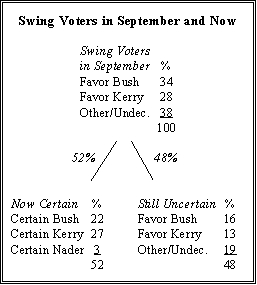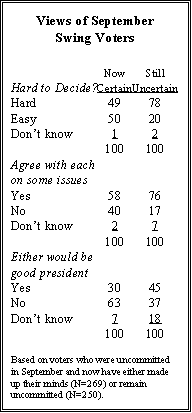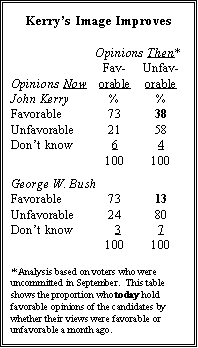Summary of Findings
 With less than a week to go before the election, many swing voters have yet to commit to a candidate, but over the past month there has been some movement among this group toward Sen. John Kerry. A Pew Research Center follow-up survey with 519 swing voters who in September were undecided or said they could change their vote finds that about half (52%) have moved off the fence, while nearly as many (48%) still are not certain of how they will vote.
With less than a week to go before the election, many swing voters have yet to commit to a candidate, but over the past month there has been some movement among this group toward Sen. John Kerry. A Pew Research Center follow-up survey with 519 swing voters who in September were undecided or said they could change their vote finds that about half (52%) have moved off the fence, while nearly as many (48%) still are not certain of how they will vote.
Overall, Kerry has made more substantial gains among these swing voters in the past month than has Bush. Today, 40% say they are either certain to vote for Kerry or are leaning toward him (up from just 28% who leaned in Kerry’s direction a month ago). Bush’s support among this group of swing voters stands at 38%, up only slightly from 34% in September.
Those who have decided on their vote in the past month mention the debates as a crucial factor in their decision more than any other events or issues, especially those who have committed to Kerry (45% among those who cited a reason).
 The remaining swing voters identified in the call-back survey are a diverse group, but they take common positions on several issues. About three-quarters (76%) say they agree with Bush on some important issues and with Kerry on others. Consequently, a 45% plurality believes that either Bush or Kerry would make a good president. As expected, most uncommitted voters (78%) say it has been hard to decide whom to vote for.
The remaining swing voters identified in the call-back survey are a diverse group, but they take common positions on several issues. About three-quarters (76%) say they agree with Bush on some important issues and with Kerry on others. Consequently, a 45% plurality believes that either Bush or Kerry would make a good president. As expected, most uncommitted voters (78%) say it has been hard to decide whom to vote for.
Committed voters who have made up their minds since September largely agree that it is a difficult choice and that both candidates have some strong issues. And more of those who recently committed to Kerry say the decision has been a hard one (61%) than those who committed to Bush (38%). However, the recently decided supporters of both candidates have come to the view that only one candidate would make a good president. More than six-in-ten newly committed voters (63%) disagree with the idea that either Bush or Kerry would make a good president.
The poll, which called back respondents initially interviewed Sept. 8-26, finds that even at this late stage in the campaign, half of remaining swing voters say they do not know enough about Bush and Kerry. That compares with about a third of those who have committed to a candidate since September (34%). Moreover, only about half of the remaining swing voters (53%) believe it really matters who wins the election, compared with 71% of recently decided voters.
For months, a defining characteristic of swing voters has been that, unlike committed voters, they have favorable opinions of both candidates. That generally remains the case even for swing voters who have recently made up their minds; 56% have a positive view of Kerry, while 47% have a favorable opinion of Bush. The remaining swing voters also have generally favorable impressions of both candidates. But much smaller percentages express unfavorable opinions of Bush and Kerry, suggesting that remaining swing voters still do not have clearly defined impressions of the two men.
 Still, the events of the past four weeks did more to polish Kerry’s image than Bush’s among those who were uncommitted in September. Of the swing voters who expressed an unfavorable view of Kerry then, most (58%) continue to express a negative opinion of him, but nearly four-in-ten (38%) now have a favorable opinion of Kerry. By contrast, there has been less movement among those who held an unfavorable opinion of Bush; just 13% have changed their minds and now have a positive opinion of Bush. Both candidates are now viewed negatively by some who liked them last month, but the shift has been about the same for each candidate (21% for Kerry, 24% for Bush).
Still, the events of the past four weeks did more to polish Kerry’s image than Bush’s among those who were uncommitted in September. Of the swing voters who expressed an unfavorable view of Kerry then, most (58%) continue to express a negative opinion of him, but nearly four-in-ten (38%) now have a favorable opinion of Kerry. By contrast, there has been less movement among those who held an unfavorable opinion of Bush; just 13% have changed their minds and now have a positive opinion of Bush. Both candidates are now viewed negatively by some who liked them last month, but the shift has been about the same for each candidate (21% for Kerry, 24% for Bush).
The cross-pressures that are making it difficult for the remaining swing voters to commit are reflected in their attitudes toward issues. Three-in-ten (29%) say the economy is most important to their vote, which places them closer to certain Kerry voters than Bush supporters. At the same time, they give terrorism much higher priority than do committed Kerry voters.
Iraq Key to Movement Toward Kerry
On the issue of Iraq, swing voters also fall between Kerry and Bush voters. A plurality of the remaining swing voters (46%) believes it was the right decision to go to war in Iraq. Newly committed Kerry voters overwhelmingly reject the decision to go to war (76%), while 66% of those who have recently decided to vote for Bush say the war was the right decision.
 When swing voters were asked if they have learned anything over the past month that made them think differently about the candidates, 17% of those who have moved toward Kerry mention Iraq compared with just 9% of those who have moved toward Bush. In addition, more swing voters who have moved toward Kerry say Iraq is the most important issue in their vote (21% vs. 11% among those moving to Bush).
When swing voters were asked if they have learned anything over the past month that made them think differently about the candidates, 17% of those who have moved toward Kerry mention Iraq compared with just 9% of those who have moved toward Bush. In addition, more swing voters who have moved toward Kerry say Iraq is the most important issue in their vote (21% vs. 11% among those moving to Bush).
Who Moved and Where?
Much of the movement of swing voters since September reflects partisans returning home. Among those who shifted toward Bush, 71% consider themselves Republicans or Republican-leaning; among those who shifted toward John Kerry, 76% are Democrats or Democratic-leaning.
The presidential debates helped to give Kerry an advantage among swing voters who have shifted their views over the past month. Most swing voters watched at least some of the debates, and by more than three-to-one (44%-13%) say that Kerry did the better job in the debates. Among those who have recently committed to Kerry fully 74% said he did better.
 Moreover, when swing voters were asked if they had seen, read, or heard anything over the past month that had made them think differently about the candidates, 30% of those who mentioned something cited the presidential debates. Among those who moved toward Kerry, 39% cited the debates; only 22% of those who moved toward Bush did so.
Moreover, when swing voters were asked if they had seen, read, or heard anything over the past month that had made them think differently about the candidates, 30% of those who mentioned something cited the presidential debates. Among those who moved toward Kerry, 39% cited the debates; only 22% of those who moved toward Bush did so.
Who’s Left
The follow-up survey of swing voters gives a relatively clear picture of how the events of the past month have affected those who have now made a choice. But there are no indications of what the remaining swing voters are likely to do.
At least some of those yet to commit to a candidate may simply not vote. Roughly the same percentage of remaining swing voters as recently committed voters say they plan to vote (90% vs. 92%). But fewer remaining swing voters say they are “absolutely certain” to vote, and those who are still in the swing category are less likely to say they have thought “quite a lot” about the election (64% vs. 77% of recently decided voters).
Of the 48% of the original swing group that remains on the fence, 16% are “soft” Bush voters (favor Bush but say they could still change their mind); 13% are soft Kerry voters; and 19% are undecided. As a group, they are evenly divided in terms of underlying partisan loyalty (37% are Republican or lean Republican; 37% are Democrat or lean Democrat). Slightly more say the war in Iraq was the right decision (46%) than say it was wrong (36%). Demographically, the remaining swing voters look very much like the rest of the electorate.
National polls show that the overall swing vote is still large enough to provide either candidate with a decisive victory. The most recent Pew Research Center national survey, conducted Oct. 15-19, shows that 18% of registered voters still are undecided or may change their vote. When the sample is narrowed to likely voters, 15% are in the swing vote category.
Little Wavering Among Committed
The Pew Research Center also called back 482 voters who in September said they had decided to vote for either Bush or Kerry (241 certain Bush voters, the same
number of committed Kerry voters).
 Overwhelming majorities of these voters remain set in their voting decisions: 95% of certain voters are still firmly behind the president, while about the same number of committed Kerry supporters (94%) say they are certain to vote for him.
Overwhelming majorities of these voters remain set in their voting decisions: 95% of certain voters are still firmly behind the president, while about the same number of committed Kerry supporters (94%) say they are certain to vote for him.
A small number of voters who were certain of their choice in September now say they are only leaning or might change their minds (2% for Bush, 3% for Kerry), but hardly anyone who was certain in September now fully intends to vote for the other candidate; just five out of 482 certain Bush or Kerry voters switched sides since September.


